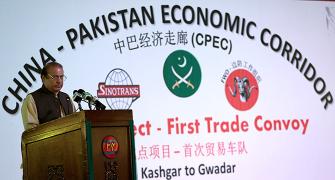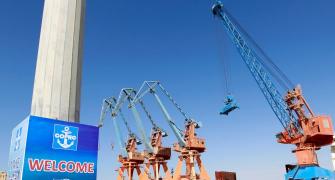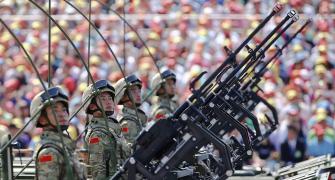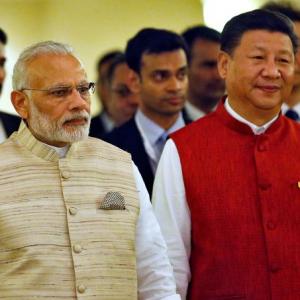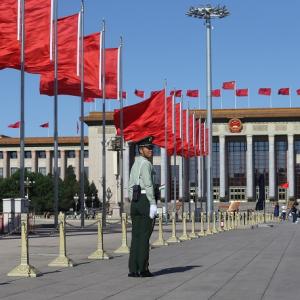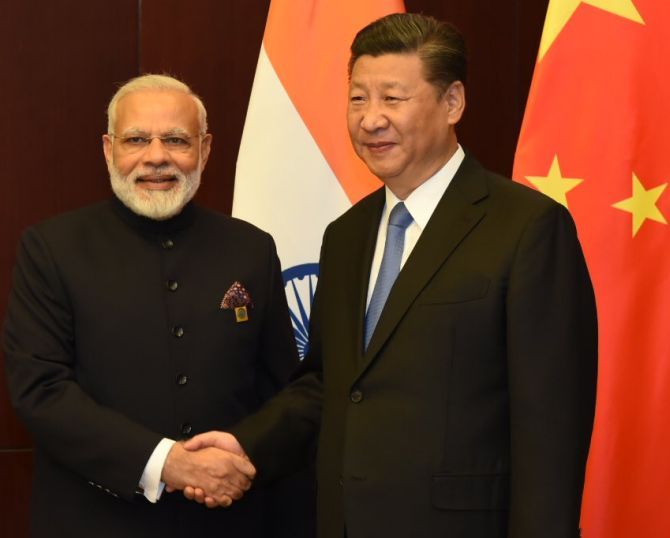
Prime Minister Narendra Modi on Friday underscored the need to respect each other's "core concerns" and appropriately handle the disputes as he held "cordial" talks with Chinese President Xi Jinping amid tensions in ties over a host of issues including the China Pakistan Economic Corridor and India's Nuclear Suppliers Group bid.
The two leaders met in the Kazakh capital, Astana, on the sidelines of the Shanghai Cooperation Organisation Summit. It is their first meeting after India boycotted the high-profile Belt and Road Forum held in Beijing last month in which 29 world leaders took part.
India abstained from the summit to highlight its concerns over the USD 50 billion China Pakistan Economic Corridor which is part of the Belt and Road Initiative and passes through Gilgit and Baltistan in Pakistan-occupied Kashmir.
During the meeting, Modi said the two sides should tap their potential in cooperation, strengthen communication and coordination in international affairs, respect each other's core concerns and appropriately handle their disputes.
The Indian side is grateful for China's support for India's accession to the SCO and will work closely with China in the organisation, Modi said.
He said it would not have been possible for India to become member of SCO without China's backing.
"There was an understanding that where we have differences, it is important that differences should not become dispute," Foreign Secretary S Jaishankar told reporters describing the meeting as "cordial" and "very positive".
Relations between India and China has witnessed a downturn owing to differences over a series of issues including China blocking India's move to get Jaish-e-Mohammed chief Masood Azhar banned by the United Nations, its opposition to India's bid for NSG membership and China's Belt and Road initiative.
Asked whether the NSG, OBOR and Azhar issues were raised, Jaishankar did not give a direct reply and said the meeting was for taking a broad assessment of the relationship.
"You should be rest assured that there was a sense that both sides should address their concerns sincerely," said the foreign secretary.
He said both the countries may have differences, but it is important to find "common grounds" and address each other's concerns "with a degree of seriousness".
Giving broad outcome of the meeting, he said India and China are factors of stability when the world is going through economic uncertainty.
Jaishankar said Modi and Xi also deliberated on defence exchanges. He said issues relating to trade and investment were a major highlight.
"Entire spectrum of bilateral cooperation was discussed," said Jaishankar.
During the meeting, Xi told Modi that the two sides should increase communication and coordination in multilateral affairs and appropriately control and handle disputes and sensitive problems, China's official Xinhua news agency said.
In Beijing, Chinese Foreign Ministry spokesperson Hua Chunying told a media briefing that both the countries "should also address sensitive and major issues" as she highlighted the issues figured in the meeting.
"India should focus more cooperation and work alongside to provide assistance to each other's developmental goals," Hua said.
"The two sides should strengthen the complementarities of the development strategies and press ahead with the major cooperation projects such as energy and railways," Hua said.
She also said the two sides should press ahead in a major way on Bangladesh, China, India, Myanmar Corridor besides tourism, culture and other relevant fields.
BCIM is part of the China's multi-billion dollar Belt and Road initiative.
Xi also congratulated India on becoming official member of the SCO, she said. "We hope that the two counties will work together to ensure the development of the SCO," he told Modi.
The SCO is a security grouping increasingly seen as a counterweight to NATO.
Faced with profound and complex changes of the international situation, China and India, as the world's two largest developing countries, should pay more attention to cooperation and go ahead with each other as partners, so as to instill more momentum into each other's development and contribute to world peace, stability and common development, said the Chinese president.
Xi said China attaches great importance to its ties with India. He called for more high-level interactions, institutionalised exchanges, strategic communication and policy alignment between the two countries, Xinhua reported.
China and India should also boost trade and investment cooperation and work together for earlier harvest from large-scale cooperation projects in such areas as production capability, industrial parks and railway construction, Xi said.
The Chinese President said his country is willing to cooperate with India within the SCO framework and contribute to the healthy and sustained development of the organisation.
China is vocal about its stand to block India's admission into the 48-member Nuclear Suppliers Group.
After Astana, Modi and Xi are also expected to cross paths at the G20 summit to be held next month in Hamburg, Germany followed by Brazil, Russia, India, China, South Africa (BRICS) summit to be held in Xiamen, China in September.
IMAGE: Prime Minister Narendra Modi meets Chinese President Xi Jinping on the sidelines of SCO summit in Astana on Friday. Photograph: @MEAIndia/Twitter

